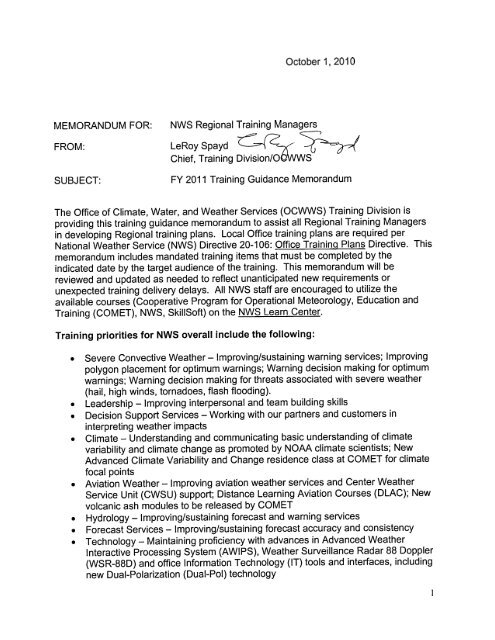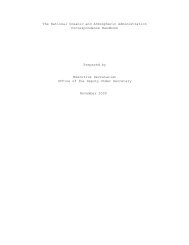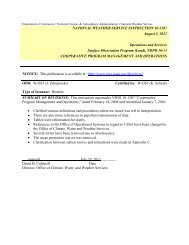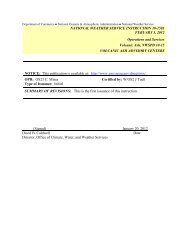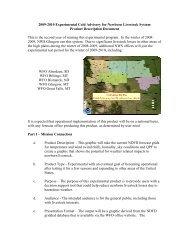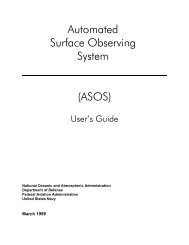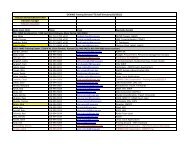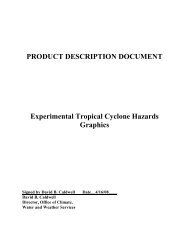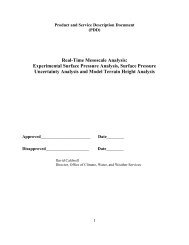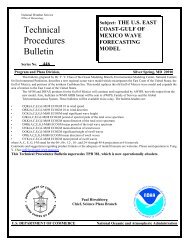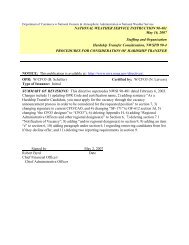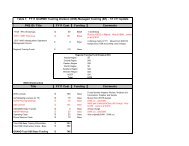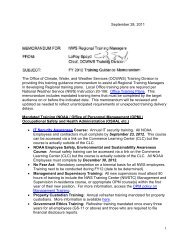Training Guidance Memo - NOAA
Training Guidance Memo - NOAA
Training Guidance Memo - NOAA
You also want an ePaper? Increase the reach of your titles
YUMPU automatically turns print PDFs into web optimized ePapers that Google loves.
• Tsunami - New modules will be released by COMET for coastal offices with<br />
tsunami responsibilities<br />
• Dispersion - New modules will be released by COMET to support NWS<br />
Instruction 10-518: Non-Weather Related Emergency Products Specification<br />
• Incident Meteorologists (IMETs) - (per Directive 10-405: Fire Weather Services<br />
<strong>Training</strong> and Professional Development)<br />
• Marine <strong>Training</strong> (per Directive 10-340: Marine Forecaster <strong>Training</strong>)<br />
• New Numerical Weather Prediction (NWP) Series releases<br />
Nationally Mandated <strong>Training</strong><br />
1. Four Weather Event Simulator (WES) Cases -All Weather Forecast Office<br />
(WFO) staff with forecast and warning responsibility are mandated to complete at<br />
least four WES simulations per year. CWSU forecasters are encouraged, but not<br />
required, to use WES simulations. As part of the four, one appropriate WES<br />
simulation must be completed prior to the start of each significant weather<br />
season, as defined by the Meteorologist-in-Charge (MIC). WES cases can be<br />
administered individually or within a group setting with oversight by the Science<br />
and Operations Officer (SOO) / Development and Operations Hydrologist (DOH)<br />
or other delegated training officer. See NWS Directive 20-101: Use of Weather<br />
Event Simulator.<br />
2. Tornado Warning/Severe Thunderstorm Warning Best Practices Modules -<br />
All WFO forecasters with warning responsibility will complete these modules (if<br />
they did not complete them in FY 2010), which can be found on the NWS Learn<br />
Center, before April 1, 2011. (Requirement: Corporate-Board-Approved Polygon<br />
Action Team, March 2010):<br />
- Rationale for Warning Best Practices<br />
- Non-Linear Motion<br />
- Limiting the Number of Counties in Warnings<br />
- Minimizing Unnecessary Overlap between Warning Polygons<br />
3. Safety <strong>Training</strong> - Annual safety training released by <strong>NOAA</strong> must be completed<br />
by all employees by the date specified. E-mails are sent to employees with<br />
details and instructions for completing the course. Estimated completion time is<br />
approximately one hour.<br />
4. IT Security - Annual IT security training released by <strong>NOAA</strong> must be completed<br />
by all employees by date specified. E-mails are sent to employees with details<br />
and instructions for completing the course. Estimated completion time is<br />
approximately one hour.<br />
5. Management - All new supervisors must attend 80 hours of training to include<br />
the National Weather Service <strong>Training</strong> Center (NWSTC) Management and<br />
Supervision course or appropriate Office of Personnel Management (OPM)<br />
2
courses within the first year of their new position (See Regulation). Warning<br />
Coordination Meteorologists (WCMs), SOOs, DOHs, and Service Coordination<br />
Hydrologists (SCHs) are eligible for Management and Supervision, as space is<br />
available. Lead forecasters are eligible to attend the Field Operations<br />
Management Course.<br />
6. No Fear Act – Mandatory completion on a biennial basis is required for all<br />
employees. Module will be released by the Department of Commerce and<br />
completion date for FY11 is unknown. Estimated completion time is<br />
approximately one hour.<br />
7. Uniformed Services Employment and Reemployment Rights Act (USERRA)-<br />
USERRA training is a mandatory training that must be completed by any NWS<br />
Supervisor or Hiring Official that has the ability to select candidates, review cert<br />
lists, interview applicants, or recruit for vacancies, etc. If the NWS supervisor or<br />
any other NWS HR Specialist has anything to do with staffing, they are required<br />
to take this course. This is a mandatory training required by OPM at least once<br />
every fiscal year as a part of the Veterans' Benefits Improvement Act of 2008,<br />
Public Law (P.L.) 110-389. In FY11, this training must be complete by or before<br />
October 25, 2010. It can be accessed on the NWS Learn Center and estimated<br />
completion time is one hour.<br />
Mandated Proficiency <strong>Training</strong><br />
1. Property Custodian <strong>Training</strong> – Annual refresher training is mandated for<br />
property custodians. Visit Logistics Operations Division for more information.<br />
2. Government Ethics training - Refresher training is mandated once every three<br />
years for all employees (GS-11 or above) and those who are required to file<br />
financial disclosure reports. Annual refresher training is mandated for Property<br />
Custodians. Visit http://www.ogc.doc.gov/ethics.html for more information.<br />
Estimated completion time is approximately one hour.<br />
3. Purchase Card <strong>Training</strong> - Refresher training required annually. Purchase<br />
Card/General Services Administration (GSA) SmartPay <strong>Training</strong> for cardholders<br />
and approving officials. Visit Purchase Card <strong>Training</strong> for more information.<br />
4. Travel Card <strong>Training</strong> - Refresher training is required once every 3 years. Travel<br />
Card/GSA SmartPay Travel Card <strong>Training</strong> for cardholders and approving<br />
officials. Visit Travel Card <strong>Training</strong> for more information. Estimated completion<br />
time is approximately one hour.<br />
5. Tower Safety <strong>Training</strong> - Mandated training for those involved with climbing<br />
towers.<br />
3
6. Contracting Officer Technical Representative (COTR) Refresher Course(s) -<br />
The purpose of this training is to provide an update of the recent changes that<br />
affect COTR responsibilities. This course offers practical guidance on how to<br />
implement these changes to meet program needs within an evolving acquisition<br />
environment. This course is intended for current and potential COTRs seeking 8<br />
hours of COTR refresher or advanced-level training for purposes of COTR recertification.<br />
Visit the COTR <strong>Training</strong> link for more information.<br />
7. Mandated Fire Weather <strong>Training</strong> - per Directive 10-405: Fire Weather Services<br />
<strong>Training</strong> and Professional Development. Please view link for details.<br />
8. Marine – All NWS Marine Forecasters are required to take marine training<br />
modules as specified in Directive 10-340: Marine Forecaster <strong>Training</strong>. Please<br />
view link for details. Five modules take 6-9 hours to complete.<br />
Recommended <strong>Training</strong> (Priority determined by Regions)<br />
1. Climate Services<br />
All employees of <strong>NOAA</strong> and the NWS represent the agency to meet mission<br />
related activities and interact with the public. Since climate change is regularly in<br />
the news, employees are often asked about this. Since most staff are not climate<br />
scientists, it is important that all staff understand the science background<br />
provided by <strong>NOAA</strong> scientists concerning the topic.<br />
a. COMET Meteorology, Education and <strong>Training</strong> (MetEd) Courses:<br />
http://www.meted.ucar.edu/topics_climate.php.<br />
2. All Warning-Related Delta <strong>Training</strong> modules (any changes in or about the<br />
Warning Program) as available. All WFO forecasters with warning responsibilities<br />
should take these courses. These modules, which can be accessed on the NWS<br />
Learn Center, include:<br />
- AWIPS I Warning-Related Delta <strong>Training</strong><br />
- Updated modules for Advanced Warning Operations Course (AWOC)<br />
(Winter, Severe, and Core) to include:<br />
a. AWIPS OB9.2 Radar Color Tables (20 minutes, AWIPS OB9.2)<br />
b. AWOC Core Instructional Component (IC) 2: Lesson 5 -<br />
Maintaining Situational Awareness by Managing the Unexpected<br />
(25 minutes, Core IC2)<br />
c. AWOC Core IC3: Lesson 4 - Incident Decision and Support (15<br />
minutes, Core IC3)<br />
d. AWOC Severe IC2: Lesson 3 - Threat Assessment of Quasi-<br />
Linear Convective Systems (QLCS) (30 minutes, Severe IC2)<br />
e. AWOC Severe IC3: Section 3 - Supercell Collapse Phase (20<br />
minutes, Severe IC3)<br />
f. AWOC Severe IC3: Section 5 - Storm Interrogation Strategies of<br />
QLCS Mesovortices (50 minutes, Severe IC3)<br />
4
g. AWOC Winter IC3: User Needs to Mitigate Societal Impacts:<br />
Road Weather (3.5 hours, Winter IC3)<br />
3. Severe Weather<br />
To provide the best warning service, forecasters need to maintain their<br />
proficiency. This requires scenario practice (see WES Scenario requirements)<br />
and staying up to date with changes to NWS policy, changes to technology<br />
(AWIPS) and updated science and conceptual models.<br />
a. Dual-Pol Operations Course: (Not available yet! Complete prior to<br />
implementation at your office). Dual-Pol <strong>Training</strong> Pages.<br />
b. Communicating High-Impact Events (Recommendation: Mother’s Day<br />
Service Assessment).<br />
c. Decision Support Services 101: The Integrated Warning Team.<br />
4. Hydrology<br />
The following modules, which are located on the NWS Learn Center, are<br />
recommended by the OCWWS Hydrologic Services Division. The target<br />
audience includes WFO forecasters, WFO Hydrologic Program Managers<br />
(HPM), and RFC forecasters and hydrologists, as noted below:<br />
a) Science and Techniques:<br />
1. Quantitative Precipitation Forecasting Overview (WFO, RFC)<br />
2. Flash Flood Case Studies (WFO)<br />
3. Dams and Dam Failure – Modules 1 and 2 (WFO HPM, RFC)<br />
4. Introduction to Distributed Hydrologic Modeling (WFO HPM, RFC)<br />
5. The NWS Hydrologic Ensemble Forecast System (WFO HPM, RFC)<br />
6. Introduction to Verification of Hydrologic Forecasts (RFC)<br />
7. Impacts of a Vertical Datum Conversion on NWS Hydrology Program and<br />
Customers.(WFO HPM, RFC)<br />
8. Precipitation Estimates, Part 1: Measurement (WFO, RF)<br />
9. Precipitation Estimates, Part 2: Analysis (WFO, RFC)<br />
b) Operational Software:<br />
1. Introduction to Hydrology Software in AWIPS (WFO)<br />
2. Using Riverpro (WFO)<br />
3. Hydroview 101 (WFO)<br />
4. SSHP for WFOs (WFO)<br />
5. Aviation<br />
Many of the modules included on COMET’s MetEd site are part of the two<br />
distance courses: DLAC 1 (Forecasting Fog/Low Stratus for Aviation<br />
Operations), which takes approximately 22-26 hours to complete, and DLAC 2<br />
(Producing Customer-Focused TAFs) which takes approximately 10-13 hours to<br />
complete.<br />
http://www.meted.ucar.edu/topics_aviation.php<br />
5
6. Leadership<br />
Local leadership enrichment programs at each office will recommend leadership<br />
training opportunities for all employees.<br />
7. Electronics Technician (ET)/Electronics System Analyst (ESA)/Information<br />
Technology Officer (ITO) <strong>Training</strong><br />
a. Dual-Pol: Maintenance training for those offices starting deployment.<br />
b. AWIPS II Operational Test and Evaluation (OT&E): The ESA and ITO will<br />
attend the AWIPS II Systems Administration class for OT&E and early<br />
deployment sites (according to April 2010 schedule).<br />
8. AWIPS II<br />
Application Focal Point <strong>Training</strong> and Variance <strong>Training</strong> will be provided prior to<br />
OT&E at early deployment sites (according to April 2010 schedule).<br />
9. Flash Flood Warning Best Practices- Will be available on the NWS Learn<br />
Center in the second quarter of FY11.<br />
Current <strong>Training</strong> Division Directives<br />
a. 20-101 Use of Weather Event Simulator<br />
b. 20-102 NSTEP and Annual IP for <strong>Training</strong> and Education<br />
c. 20-104 University Assignment Program<br />
d. 20-105 Individual Development Planning<br />
e. 20-106 Office <strong>Training</strong> Plans<br />
Other Applicable Directives<br />
a. 10-340 Marine Forecaster <strong>Training</strong><br />
b. 10-405 Fire Weather Services <strong>Training</strong> and Professional Development<br />
6


